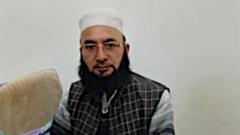Following the death of Mohammad Iqbal in cross-border shelling, a Kashmiri family's grief is compounded by media claims labeling him a terrorist. Despite clarifications from local police, the damage from misinformation has deeply affected their life and dignity.
Media Misrepresentation Intensifies Tragedy for Kashmiri Family

Media Misrepresentation Intensifies Tragedy for Kashmiri Family
The false portrayal of a deceased educator as a terrorist adds to the anguish of a family grappling with loss amidst rising tensions in Kashmir.
Farooq Ahmed sits in deep mourning, recounting the devastating loss of his brother, Mohammad Iqbal, who died on May 7 during cross-border shelling in Indian-administered Kashmir. Iqbal, a respected teacher at Zia-ul-Uloom madrassa in Poonch, fell victim to a violent aftermath of retaliatory strikes between India and Pakistan following a militant attack, one that both countries continue to dispute.
Instead of receiving condolences, the Ahmed family faced an onslaught of distressing news reports that linked Iqbal to terrorism, branding him a terrorist merely based on his appearance—his beard and skullcap. "It felt like adding insult to injury," Farooq expressed, lamenting how the media's wrongful accusations compounded their grief.
Amid rising military tensions, misinformation became rampant across social media and mainstream platforms, with news outlets spreading unfounded claims along with incendiary visuals, fueling an already charged atmosphere. Instances of disinformation included exaggerated casualty figures and fabricated incidents involving military confrontations.
"This coverage was shocking in its intensity," said Manisha Pande, managing editor of Newslaundry, highlighting the disturbing nature of the reporting surrounding a complex conflict. She emphasized the need for responsible journalism while covering such volatile events.
Touched by the unfounded allegations surrounding his brother's identity, Farooq navigated a painful reality. It was only after Iqbal was laid to rest that the family learned of the media's defamatory narrative propelled through various channels, some of which falsely stated that he was killed during an operation against terrorists.
The Poonch police were quick to respond, officially rebuking the misleading claims and reaffirming Iqbal's reputation as a distinguished member of the community. Yet for the Ahmed family, the police statement came too late, having reached a multitude of viewers before any rectification occurred.
Struggling to cope with the aftermath of loss coupled with the outrage of misrepresentation, Farooq stated, "The media should be ashamed." He is considering legal action against the networks, although financial difficulties hinder his ability to act quickly. Iqbal, a devoted educator and the family's sole breadwinner, leaves behind two wives and eight children, thrusting them into uncertainty about their futures.
"The government compensation will only secure us for a year," he explained, emphasizing their desperate need for understanding and empathy from those who believe the false narratives. "Who's going to tell our story? For many, he is still labeled as a terrorist."
As Kashmir remains a focal point of geopolitical tension, the human cost of conflict gets lost amid sensational media coverage, leaving families like the Ahmeds haunted by the dual tragedies of loss and misrepresentation.


















